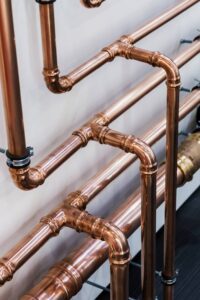
Every homeowner treasures the peaceful moments in their abode. Yet, some have experienced a sudden, unexplained loud banging from their walls after turning off a faucet or an appliance. This mysterious noise, reminiscent of a ghostly plumber with a hammer, is known as water hammer. Let’s delve into what causes it, why it might be a concern, and how you can address it.
What Causes Water Hammer?
You turn off your shower or washing machine, and suddenly there’s a loud thud echoing in your pipes. It sounds alarming, but what’s happening is a rapid stoppage of water, creating a shockwave through your plumbing system. When water, an incompressible fluid, is abruptly halted, it can produce a significant surge or wave of pressure. This is water hammer in action.
Just as a car requires time to come to a complete stop, water needs a similar gradual decrease in speed. The valves in appliances and fixtures can stop water flow too quickly, leading to that jolting sound and sensation.
Why is Water Hammer a Concern?
While the noise itself can be unsettling, the real issues lie hidden. Over time, the constant pressure and shockwaves can lead to:
- Compromised pipe integrity, making them more susceptible to breaks.
- Damage to pipe joints, causing leaks.
- Wear and tear on appliance valves and faucets.
All of these can result in more extensive repairs and replacements if not addressed promptly.
How Can You Prevent and Fix Water Hammer?
If you’ve identified water hammer in your home, don’t fret. There are steps you can take to prevent and even fix this phenomenon:
- Adjusting Water Pressure. Often, water hammer is exacerbated by high water pressure in your home. Using a pressure regulator can help maintain an appropriate water pressure level, reducing the chances of water hammer occurrences.
- Installing Water Hammer Arrestors. These devices are specially designed to absorb the shockwave produced by halted water flow. By fitting them close to quick-closing valves, like those in washing machines or dishwashers, you can directly address the source of the issue.
- Ensuring Properly Sized Pipes. Pipes that are too small can’t handle the rapid flow and sudden stoppage of water effectively. If retrofitting is an option, consider upsizing your pipes.
- Regular Maintenance. Like all parts of a home, your plumbing needs regular check-ups. Having a professional inspect your system can help identify potential issues before they become problematic.
With these measures, not only will you reduce the likelihood of water hammer, but you’ll also extend the lifespan of your plumbing system.
Can Old Homes be More Susceptible?
Many older homes were constructed with air chambers to prevent water hammer. These chambers, over time, can become waterlogged, making them ineffective. In such cases, restoring or replacing them can help alleviate the issue. Furthermore, the plumbing in older homes might not have been designed with modern water-using appliances in mind, making them more susceptible to water hammer. Regular inspections and adjustments can ensure your vintage home remains in top shape.
How Do Air Chambers Help Mitigate Water Hammer?
Air chambers are a popular and effective solution in the battle against water hammer. Essentially, they’re vertical pipes installed near the water valves, designed to capture the shockwave produced when flowing water is suddenly stopped. When the valve closes quickly, the air in the chamber compresses, absorbing the shock and preventing the loud banging noise typical of water hammer.
Over time, however, these chambers can fill with water and become less effective. It’s a good practice to drain your home’s plumbing system annually to restore these air chambers.
If you’re experiencing persistent water hammer or other plumbing issues, don’t wait for them to escalate. Reach out to Spartan Plumbing Inc. and bring serenity back to your home.
